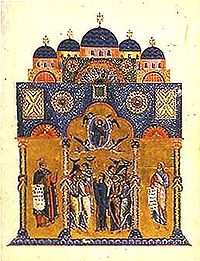
331
Encyclopedia

Common year starting on Friday
This is the calendar for any common year starting on Friday, January 1 . Examples: Gregorian years 1993, 1999, 2010 and 2021or Julian years 1910 and 1899 ....
(link will display the full calendar) of the Julian calendar
Julian calendar
The Julian calendar began in 45 BC as a reform of the Roman calendar by Julius Caesar. It was chosen after consultation with the astronomer Sosigenes of Alexandria and was probably designed to approximate the tropical year .The Julian calendar has a regular year of 365 days divided into 12 months...
. At the time, it was known as the Year of the Consulship of Bassus and Ablabius (or, less frequently, year 1084 Ab urbe condita
Ab urbe condita
Ab urbe condita is Latin for "from the founding of the City ", traditionally set in 753 BC. AUC is a year-numbering system used by some ancient Roman historians to identify particular Roman years...
). The denomination 331 for this year has been used since the early medieval period, when the Anno Domini
Anno Domini
and Before Christ are designations used to label or number years used with the Julian and Gregorian calendars....
calendar era
Calendar era
A calendar era is the year numbering system used by a calendar. For example, the Gregorian calendar numbers its years in the Western Christian era . The instant, date, or year from which time is marked is called the epoch of the era...
became the prevalent method in Europe for naming years.
Roman Empire
- Emperor Constantine the Great vigorously promotes ChristianityChristianityChristianity is a monotheistic religion based on the life and teachings of Jesus as presented in canonical gospels and other New Testament writings...
, confiscating the property and valuables of a number of paganPaganismPaganism is a blanket term, typically used to refer to non-Abrahamic, indigenous polytheistic religious traditions....
temples throughout the Roman EmpireRoman EmpireThe Roman Empire was the post-Republican period of the ancient Roman civilization, characterised by an autocratic form of government and large territorial holdings in Europe and around the Mediterranean....
. - Constantine I dedicated the Church of the Holy ApostlesChurch of the Holy ApostlesThe Church of the Holy Apostles , also known as the Imperial Polyandreion, was a Christian church built in Constantinople, capital of the Eastern Roman Empire, in 550. It was second only to the Church of the Holy Wisdom among the great churches of the capital...
in ConstantinopleConstantinopleConstantinople was the capital of the Roman, Eastern Roman, Byzantine, Latin, and Ottoman Empires. Throughout most of the Middle Ages, Constantinople was Europe's largest and wealthiest city.-Names:...
. - Constantine I promulgates a law against divorce.
Religion
- Gregory the IlluminatorGregory the IlluminatorSaint Gregory the Illuminator or Saint Gregory the Enlightener is the patron saint and first official head of the Armenian Apostolic Church...
withdraws to a small sanctuarySanctuaryA sanctuary is any place of safety. They may be categorized into human and non-human .- Religious sanctuary :A religious sanctuary can be a sacred place , or a consecrated area of a church or temple around its tabernacle or altar.- Sanctuary as a sacred place :#Sanctuary as a sacred place:#:In...
in the DaranaliDaranaliDaranali was an old district of Armenia c. 400–800....
province (ArmeniaArmeniaArmenia , officially the Republic of Armenia , is a landlocked mountainous country in the Caucasus region of Eurasia...
).
Births
- Jovian, Roman EmperorRoman EmperorThe Roman emperor was the ruler of the Roman State during the imperial period . The Romans had no single term for the office although at any given time, a given title was associated with the emperor...
(d. 364364Year 364 was a leap year starting on Thursday of the Julian calendar. At the time, it was known as the Year of the Consulship of Augustus and Varronianus...
) - Julian the ApostateJulian the ApostateJulian "the Apostate" , commonly known as Julian, or also Julian the Philosopher, was Roman Emperor from 361 to 363 and a noted philosopher and Greek writer....
, Roman Emperor (d. 363363Year 363 was a common year starting on Wednesday of the Julian calendar. At the time, it was known as the Year of the Consulship of Iulianus and Sallustius...
) - Yao ChangYao ChangYao Chang , courtesy name Jingmao , formally Emperor Wuzhao of Qin , was the founding emperor of the Chinese/Qiang state Later Qin...
, emperor of the Qiang state Later QinLater QinThe Later Qin was a state of Qiang ethnicity of the Sixteen Kingdoms during the Jin Dynasty in China. Note that the Later Qin is entirely distinct from the ancient Qin Dynasty, the Former Qin, and the Western Qin....
(d. 394394Year 394 was a common year starting on Sunday of the Julian calendar. At the time, it was known as the Year of the Consulship of Flavianus without colleague...
)

